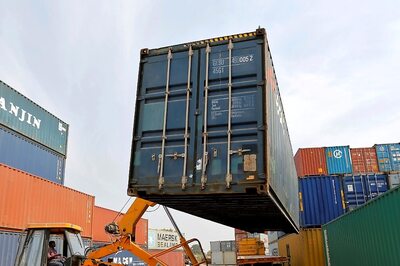
views
Important structural reforms undertaken by the government to combat risks associated with the coronavirus pandemic will strengthen the country's economic fundamentals and ensure long-term sustained growth, a report by Finance Ministry has said. "The enabling policy environment and initiatives taken by all stakeholders to seize the available opportunities will actualise the growth potential of the Indian economy," the monthly economic report prepared by the Economic Affairs Department of the Finance Ministry said.
The sustained spread of the virus poses a downside risk to short-term and medium-term growth rate, it said adding that the government has strategically undertaken various important structural reforms, encompassing various sectors, to combat these risks. The report said data for the 14-day period from September 17 to 30 suggests that India may have crossed the peak of COVID-19 caseload.
During this period, the seven-day moving average of daily positive cases steadily declined from about 93,000 to 83,000, while the seven-day moving average of daily tests rose from about 1,15,000 to 1,24,000, it said. "The pandemic however is far from over. Yet, the declining positivity rate at all-India level sets the stage to further push up the frontiers of economic recovery," it added.
According to the report, major structural reforms launched by the government in agriculture markets, labour laws and definition of MSMEs provide unparalleled opportunity for the resilient MSME sector to grow and prosper now and thereby, contribute to job creation in the primary and secondary sectors. The historic labour reforms, discussed for three decades after the conditionality in the 1991 loan from International Monetary Fund (IMF) but never implemented thus far, will benefit MSMEs to increase employment, enhance labour productivity and thereby wages in MSMEs, it said.
Saying that the reforms in agricultural sector were overdue, it said the existing laws kept Indian farmers enslaved to the local mandi and their rent-seeking intermediaries. The implementation of 'Aatmanirbhar Bharat' package and unlocking of the economy have ensured that economic recovery in India has gained momentum.
During the month, other high-frequency indicators also improved in sync with global activity and India's export rose 5.3 per cent in September on annual basis, the report said. As on September 25, India's foreign exchange reserves stood at USD 542.02 billion, equivalent to more than 13 months of imports and offer a comfortable buffer to provide for surge in imports following acceleration in the pace of economic activity, it added.
In its latest review, S&P Global Ratings retained India's investment grade (BBB-) credit rating with stable outlook as it expects the country's economy and fiscal position to stabilize and begin to recover from 2021 onwards. India's probable growth path is visible in this assessment, the report said.




















Comments
0 comment